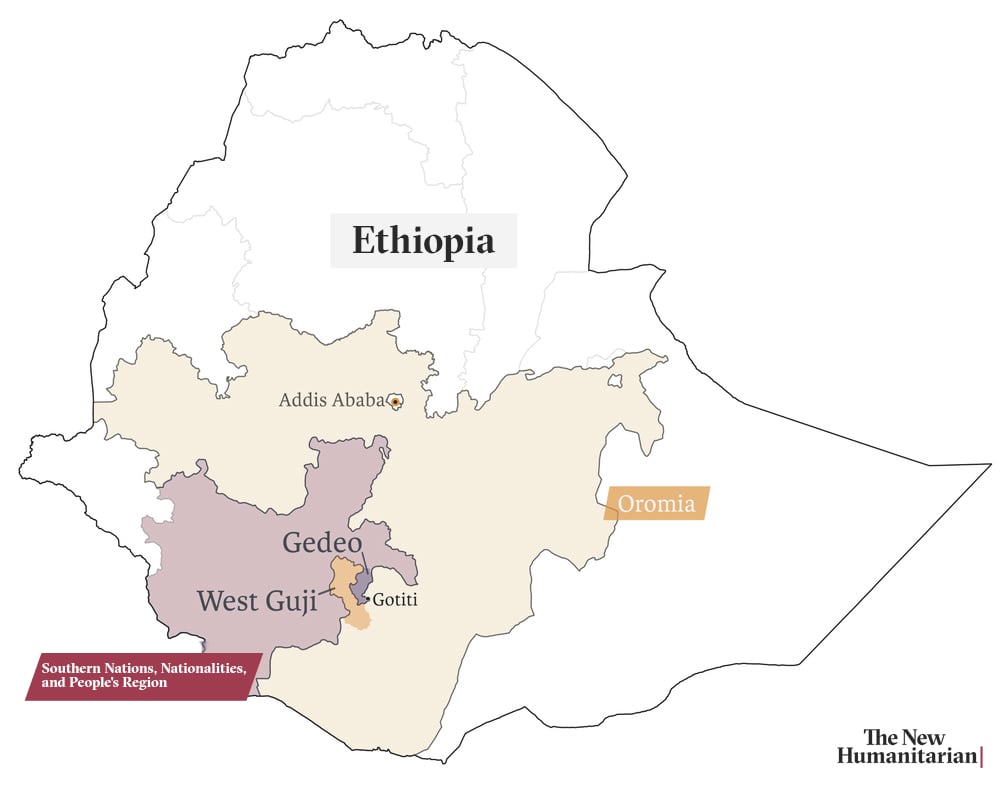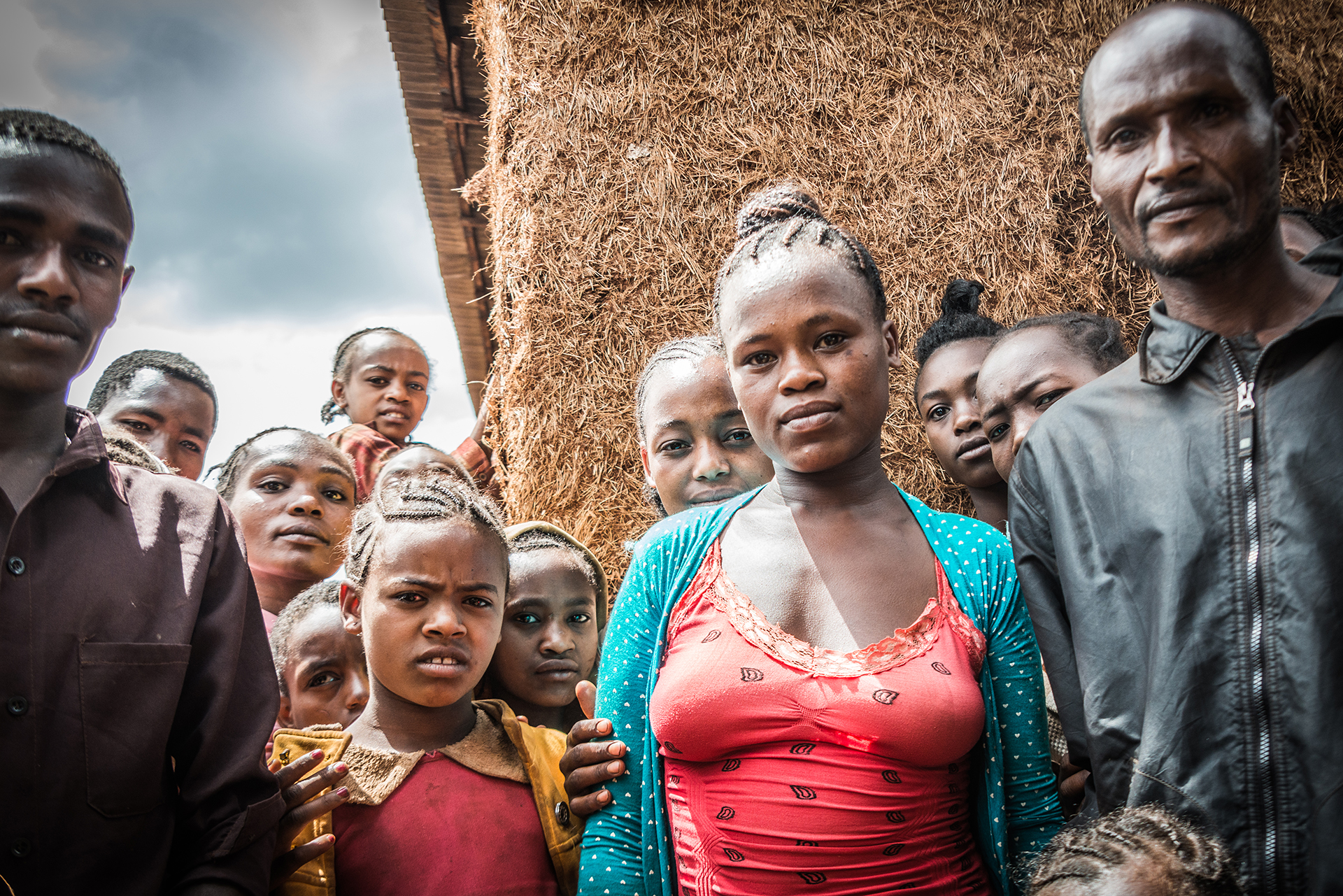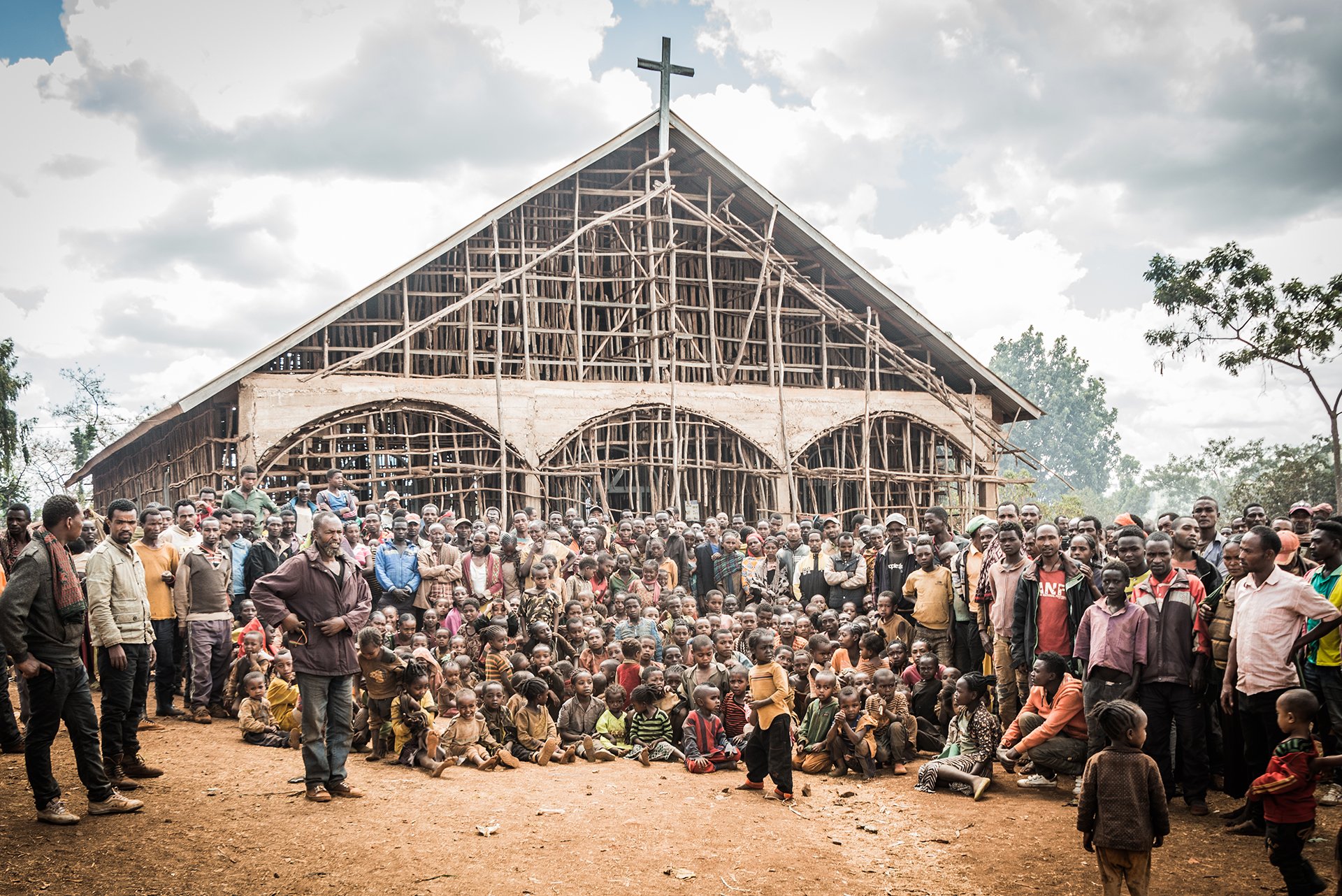When the men came with their guns and their knives, Meret Sisay’s mother stopped them at the door to their home in Ethiopia’s Oromia region, while the 18-year-old slipped out the back and fled for her life.
It was the second time in less than a year that Meret – like thousands of others from the Gedeo community who have lived in Oromia’s West Guji zone for decades – had been chased from her village because of her ethnicity.
A merry-go-round of forced evictions by groups of armed young men and government-pressured returns has left tens of thousands of ethnic Gedeos trapped in dire conditions in makeshift shelters across this part of southern Ethiopia.
Now in the village of Gotiti, in the Gedeo district of the Southern region that borders Oromia, Meret is one of an estimated 20,000 to 30,000 internally displaced people living in overcrowded shelters without roofs and sanitation as the rainy season approaches.

The Ethiopian government has not formally acknowledged Gotiti's inhabitants as IDPs eligible for humanitarian aid.
Aid workers say food assistance for IDPs in several areas near the border with West Guji, including Gotiti, has been blocked in order to encourage inhabitants to return to Oromia. They also say they’re worried about the spread of infectious diseases.
When IRIN visited in February, families of up to 10 individuals were living in wooden shelters well below UN standards for camp shelter space. Many children had swollen bellies – a sign of malnutrition – as well as scabies, diarrhoea, and other indications of unhygienic living conditions.
Meret was one of almost one million Ethiopians uprooted between April and June by ethnic violence in this part of the country, after Gedeos were accused by their Oromo neighbours of trying to annex land and resources.
In December, after she and her seven siblings had followed government orders and returned home, she became one of around 15,000 who fled Oromia once again for the safety of Gedeo district.
Those that arrived in Gedeo reported tales of castration, the cutting off of limbs, and gang rape by local youth and armed rebels, as well as general intimidation and extortion.

Meret had been back in her village for only two days before armed groups of young men began harassing her and her family. “When we arrived back we started building houses,” she told IRIN. “But [the men] took everything the government had given us... They sent us back empty-handed.”
‘At night they come in mobs’
In total, more than 1.4 million Ethiopians were forced from their homes in the first half of last year – the largest internal displacement anywhere in the world in 2018 – as ethnic and land-fuelled conflicts exploded across the country following the appointment of reformist Prime Minister Abiy Ahmed and the end of authoritarianism, which for decades had kept a lid on such tensions.
The policy of the federal government is that displaced households should be safely returned to the communities from which they were evicted, though in some cases resettlement may be possible for those who do not wish to go back.
A new ‘Action Plan’ drawn up in February by the National Disaster Risk Management Commission, or NDRMC, aims to resettle or return all IDPs within 60 days. A survey will determine which ones are expected to return to their original homes and which will be resettled elsewhere.
The NDRMC’s commissioner, Mitiku Kassa, said the tight deadline was because of the approaching rains and the need for farmers to prepare their lands in time to plant crops. “Otherwise they will be dependent on food aid next year as well,” he said.
Mitiku told IRIN he expected displaced Gedeos to return to their original homes. “We don’t have any plan to resettle Gedeos,” he said.
Aid workers, as well as the IDPs themselves, expressed concern about the timeline for returns, which according to UN guidelines should be safe, voluntary, sustainable, and dignified.
Several previous attempts to send Gedeos back to Oromia – sometimes by simply putting them on trucks and buses – have backfired. For example, mass displacement occurred in June last year shortly after the return of many of those evicted two months earlier.
A survey conducted by the government and the UN’s refugee agency, UNHCR, at the end of last year found that at least 90 percent of IDPs in Gedeo did not want to return yet.
“The government is saying we have to go back,” said Bekele Worasa, 45, a coffee farmer currently living in Gotiti. “But how can we do that when there are people dying there still?”
“During the day it seems peaceful,” said Tegeno Tiba, 86, now living in an orphanage in the Gedeo town of Chelelektu. “But at night they come in mobs, singing and dancing. You can hear gunshots, and they throw stones. They harass and intimidate us.”



Changing demographics
Aid workers worry that the deadline could be connected to the upcoming national census, which is due to start in April and may further complicate the situation in West Guji, where tensions between the ethnic groups have been exacerbated by anxieties about their respective population sizes.
The 2007 census found that 14 percent of the wider West Guji zone were Gedeo, and 79 percent Oromo.
Berhanu Fekele of World Vision International explained how Oromos in Kercha, West Guji’s most unstable district, believed Gedeos had become the most populous ethnic group. This, he said, is what prompted the claims that Gedeos planned to annex it from Oromia and sparked the conflict.
“You want to reverse-move people before a census and hope it doesn’t kick off?” one aid worker asked, concerned there would be further violence once the census begins in April. “That is what really keeps me up at night.”
In places like Kercha, returning Gedeos are now sheltering in makeshift “collection centres” around the main town like coffee marketplaces or churches because they fear it is too dangerous to return to their villages. Many say their properties have been stolen or destroyed.

Moreover, since August, NGOs working in West Guji have repeatedly expressed concern that returning Gedeos were being excluded from the lists of those in need of humanitarian assistance drawn up by local authorities.
Ethiopia’s government tightly controls the process of determining those in need. Under its system of ethnically organised federalism that power is in the hands of low-level officials who may, according to aid workers, show bias towards those of their own ethnicity.
Agencies operating in West Guji have reported that in some places the majority of those listed in need of assistance in recent months have not been IDPs. They have also reported that some households have been deliberately allocated food rations insufficient for their size.
These reports are what are driving concerns that local authorities are trying to rid the zone of Gedeos. It is only in the past month that humanitarian agencies have been allowed to carry out formal verification checks before carrying out aid distributions.
“We’re talking about systematic breaches of humanitarian principles – it’s tragic, actually, and it keeps on going,” the head of one international NGO working in the area told IRIN on condition of anonymity, due to concerns his group could lose access if it was openly critical.
Food aid blocked
In Gedeo, food distribution in Gotiti and certain other sites near the border with West Guji has been blocked since August in order to encourage IDPs to return to Oromia, aid workers and officials working with international organisations told IRIN, also on condition of anonymity.
It is unclear whether this policy comes from the higher levels of the federal government. However, according to aid workers, a federal official from the newly formed Ministry of Peace visited Gedeo in December and instructed agencies not to give assistance at these sites.
“This is an enormous problem for the government, but what is tragic is they are not accepting the support we are offering. They are forbidding us from operating.”
The Ministry of Peace has since said that more than a million people displaced due to conflicts around the country – over 90 percent of the total – have now returned to their villages, a claim that many aid workers said they doubted.
“This is an enormous problem for the government,” said a senior official with an international organisation working in the area. “But what is tragic is they are not accepting the support we are offering. They are forbidding us from operating.”
According to Ayyale Maaro Bokko, head of the local administration of Gedeb, where Gotiti is located, all displaced Gedeos will receive humanitarian assistance in West Guji should they return.
“We encourage them to go back and get the necessary support there. The government is fully supporting those who are in West Guji now,” he said, adding that any insecurity in the region would soon be resolved.
According to the African Union’s Kampala Convention on IDPs – which Ethiopia has signed but still not ratified – displaced persons are entitled to freedom of movement and to adequate humanitarian assistance wherever they need it.
But in the past month aid workers have reported that local authorities in West Guji have told them they cannot give assistance to IDPs who refuse to return to their original villages.
In Gedeo, Abraham Dube, the leader of a committee of IDPs in Gotiti, said he had tried returning to Oromia as many as four times since April. He now lives with four families – 30 people in total – in a single four-square-metre tent.
He said six people had died from malnutrition in his camp (known as ‘Spring Site’) and that he had not had any contact with government officials for the duration of his time there. He and all other IDPs in Gedeo – including those in other parts of the district who have been receiving humanitarian assistance – told IRIN they didn’t believe it was safe to return to Oromia.
“We have nothing here,” said Abraham. “We grew up there and our land is there. But unless the government brings peace, we will die here.”
(TOP PHOTO: Some 20,000-30,000 displaced people now live in makeshift shelters like these in the village of Gotiti. CREDIT: Tom Gardner/IRIN)
tg/si/ag





